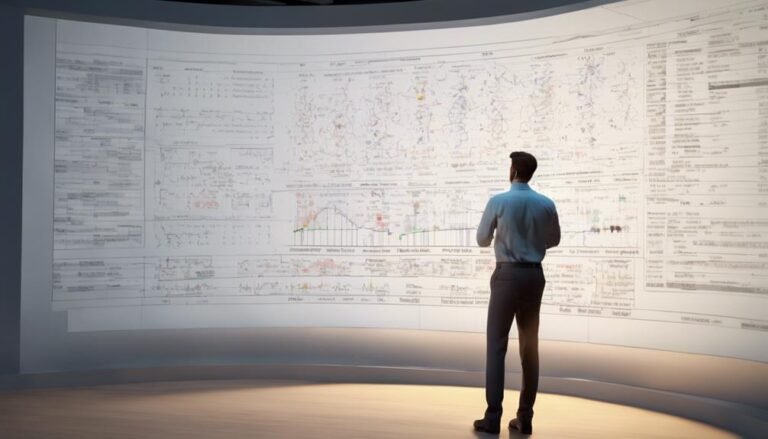Judge Job Description
A Judge's job requires legal expertise, moral integrity, and fairness in implementing the law for courtroom justice and societal order. Qualifications include a law degree, moral character, and passing necessary exams. Responsibilities entail interpreting laws, conducting hearings, and upholding order. Decision-making impacts legal precedents and societal norms. Judges must possess strong legal knowledge, analytical skills, and understand legal complexities. Managing cases efficiently and communicating clearly are essential. A deeper understanding of courtroom dynamics and legal procedures is necessary. Further exploration reveals the intricate details important for excelling in this honorable profession.
Key Takeaways
- Interpreting and applying the law accurately and fairly.
- Presiding over hearings, evaluating evidence, and maintaining courtroom order.
- Upholding judicial independence, integrity, and the rule of law.
- Demonstrating strong moral character, impartiality, and sound judgment.
- Possessing a Juris Doctor (J.D.) degree and legal experience as a licensed attorney.
Qualifications and Education Requirements
To become a judge, candidates must meet specific qualifications and education requirements that are essential for carrying out the responsibilities of the position effectively. Qualifications typically include being a licensed attorney with a certain number of years of legal experience, often ranging from five to ten years. Additionally, candidates must exhibit a strong moral character, integrity, impartiality, and sound judgment. Education requirements for judges usually entail holding a Juris Doctor (J.D.) degree from an accredited law school. Some jurisdictions may also require candidates to pass a written exam or undergo a selection process by a judicial nominating commission.
Having a solid educational foundation in law is vital for judges to interpret and apply the law correctly. Furthermore, the qualifications and education requirements ensure that judges have the necessary skills and knowledge to uphold justice, fairness, and the rule of law in their decision-making processes. Meeting these criteria helps maintain the integrity and credibility of the judicial system.
Roles and Responsibilities Overview
In fulfilling their duties, judges are entrusted with the critical task of interpreting and applying the law to guarantee justice and fairness in legal proceedings. Judges have various roles and responsibilities that are essential to the functioning of the judicial system. They must preside over hearings, listen to arguments from both parties, evaluate evidence presented, and make impartial decisions based on the law. Additionally, judges are responsible for maintaining order in the courtroom, ensuring that proceedings are conducted in a fair and respectful manner.
To qualify as a judge, individuals typically need to have a law degree, extensive legal experience, and a deep understanding of the legal system. Strong analytical and decision-making skills are crucial for judges to effectively interpret and apply the law. Moreover, judges must possess excellent communication skills to clearly explain their rulings and maintain the integrity of the judicial process.
Courtroom Conduct and Etiquette
Courtroom conduct and etiquette are paramount elements of maintaining decorum and respect within legal proceedings. Professional etiquette and demeanor are expected from all individuals present in the courtroom, including judges, lawyers, witnesses, and spectators. Maintaining courtroom decorum involves following established protocols such as standing when the judge enters or exits the courtroom, addressing the judge as 'Your Honor,' and refraining from any disruptive behavior.
Professional etiquette extends to how individuals interact with each other, showing respect for all parties involved, regardless of the circumstances. This includes active listening, refraining from interruptions, and dressing appropriately in business attire. Non-verbal cues such as body language and eye contact also play a significant role in conveying professionalism and respect within the courtroom setting.
Decision-Making Process and Impact
The decision-making process of judges is a critical aspect of their role, as it shapes the outcomes of legal cases. Understanding how judges arrive at their decisions involves a detailed analysis of legal principles, precedents, and the facts of each case.
These decisions have a significant impact on the parties involved, setting legal precedents and influencing future cases.
Judicial Decisions Influence
Through meticulous analysis of legal precedents and statutes, judges meticulously weigh the factors that influence their decision-making process and ultimately shape the impact of their judicial decisions.
Judicial decisions have a significant influence on society by setting legal precedents that guide future cases and shape societal norms. The concept of stare decisis, or letting prior decisions stand, contributes to consistency and predictability in the legal system, impacting how laws are interpreted and applied.
Additionally, judicial independence is pivotal in ensuring that judges can make decisions free from external pressures, thereby upholding the integrity and impartiality of the judicial system. By upholding the rule of law and protecting individual rights, judges play a crucial role in shaping the legal landscape and society as a whole.
Decision-Making Procedures Explained
In the domain of judicial decision-making, the process involves a thorough examination of legal principles and factual evidence to determine the course of action with significant societal implications.
When faced with ethical dilemmas, judges must carefully weigh ethical considerations to guarantee that their decisions uphold the principles of justice and integrity.
Consistency and fairness are paramount in the decision-making process to uphold public trust in the legal system. Judges must apply the law impartially, considering precedents and legal interpretations to secure uniformity in their rulings.
Legal Knowledge and Interpretation
Legal knowledge is the cornerstone of a judge's role, requiring a deep understanding of the law and its intricacies.
Beyond mere knowledge, judges must possess exceptional interpretation skills to apply the law correctly to each unique case that comes before them.
Having an extensive knowledge of laws and legal precedents is paramount for judges to make well-informed and just decisions.
Legal Expertise Essential
An in-depth understanding and interpretation of complex legal principles is fundamental for fulfilling the role of a judge effectively. To excel in legal expertise and maintain courtroom decorum, a judge must possess the following attributes:
- Comprehensive Knowledge: A judge must have a deep understanding of laws, regulations, and legal precedents.
- Analytical Skills: The ability to critically analyze legal issues and apply relevant laws is pivotal for making sound judgments.
- Attention to Detail: Judges need to pay close attention to facts, evidence, and legal arguments presented in court.
- Impartiality: Upholding fairness and impartiality in decision-making, regardless of personal biases, is essential for judicial integrity.
Interpretation Skills Crucial
Possessing adept interpretation skills is paramount for a judge to navigate the complexities of legal knowledge and effectively apply it in the judicial decision-making process. Interpretation accuracy is vital as judges must analyze statutes, regulations, and precedents to make informed decisions.
Critical thinking skills are essential for judges to assess the relevance and applicability of legal principles to specific cases. By carefully interpreting legal texts and arguments presented in court, judges can uphold the integrity of the legal system and guarantee fair outcomes.
Additionally, judges must possess the ability to decipher complex legal language and apply it logically to the facts of each case. Ultimately, honing interpretation skills allows judges to make well-reasoned decisions that uphold justice and the rule of law.
Knowledge of Laws
Understanding the complexities of legal systems requires judges to have a profound knowledge of laws, encompassing both legal knowledge and the ability to interpret statutes, regulations, and precedents effectively. Judges must possess a strong foundation in legal principles to guarantee fair and just decisions. Key aspects of legal expertise include:
- In-depth understanding of constitutional law
- Familiarity with civil and criminal procedure
- Ability to analyze case law and apply relevant precedents
- Knowledge of statutory construction principles
A judge's proficiency in legal interpretation plays an essential role in upholding the rule of law and delivering judgments that align with the principles of justice and equity. Their mastery of legal concepts enables them to navigate intricate legal issues and render decisions that uphold the integrity of the judicial system.
Case Management and Scheduling
Effective case management and scheduling are crucial in guaranteeing the smooth operation of a judicial system. Judges must master time management to handle the various cases that come before them promptly. This involves allocating sufficient time for each case based on its complexity and urgency. Additionally, judges need to maintain efficiency in scheduling by setting realistic timelines for hearings, trials, and other legal proceedings while avoiding unnecessary delays.
To excel in case management, judges must prioritize tasks, allocate resources wisely, and ensure that cases progress without undue procrastination. By effectively managing their caseloads, judges can uphold the principles of justice and fairness while also meeting legal requirements and deadlines. In addition to overseeing individual cases, judges must also consider the overall caseload of the court to prevent backlogs and bottlenecks in the legal system.
Moreover, judges need to adapt their schedules flexibly to accommodate unexpected events or emergencies without compromising the efficiency of the court's operations. By mastering case management and scheduling, judges can maintain order, uphold the rule of law, and make sure that justice is served effectively and expeditiously.
Communication and Interpersonal Skills
Judges must effectively communicate and demonstrate strong interpersonal skills to interact professionally with all parties involved in legal proceedings. Effective communication and building relationships are vital components of a judge's role in ensuring fair and just outcomes. Here are key aspects related to communication and interpersonal skills for judges:
- Active Listening: Judges must attentively listen to all parties, including attorneys, witnesses, and defendants, to understand the case thoroughly.
- Clarity in Verbal and Written Communication: Judges need to articulate their thoughts clearly and write decisions in a manner that is easily understood by all parties.
- Impartiality: Maintaining impartiality is essential in communication to uphold the integrity of the legal system.
- Conflict Resolution: Judges should possess the skills to mediate and resolve conflicts that may arise during legal proceedings, fostering a respectful and constructive environment.
Conclusion
In summary, a judge plays a vital role in the legal system by applying their legal knowledge to make fair and impartial decisions.
While some may argue that the job of a judge is challenging and demanding, it is essential for upholding justice and maintaining order in society.
Judges must possess a range of qualifications and skills to effectively carry out their duties and guarantee that justice is served.







